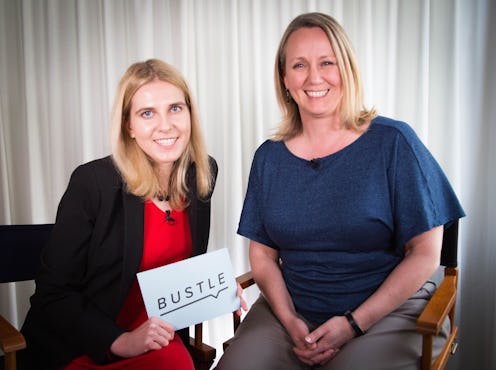News
What Women Running For Office Are Up Against

If you've ever witnessed a political campaign on any level of government, you probably assumed that it's not an easy thing to do. And you'd be right — it's not easy, but it is totally possible, and EMILY's List wants you to know that. If you want to run for office, women are up against a lot of obstacles, but none of them should be a complete and total roadblock. Bustle Politics Editor Emily Shire sat down with EMILY's List president Stephanie Schriock to dispel some frequent myths and answer some burning questions about what running for office actually entails.
Getting started can be the most intimidating part, but Schriock emphasizes that you shouldn't let that stop you from launching your political campaign, whether it's a seat in the U.S. House of Representatives or on your local school board. That said, for someone who's new in politics, Schriock allows that it can be easier to build up your political credentials at the local level, where you can more easily network with local elected officials and talk to people on the ground.
One thing that you might run into, Schriock says, is resistance from the so-called establishment types, who might use a phrase that women hear all too often: "It's not your turn." If you hear that, take it as an invitation to go and make your case to those people — why you? Why now? Even if you don't convince them on the first try, they're going to remember your effort and be impressed by that.
One of the keys to running, Schriock says, is to build a political coalition of people who will support you. EMILY's List, with their goal of electing as many women to office as possible, is always a good place to start — and then you should go to various groups operating in your community, she adds. This could include the city or county office of the Democratic Party, your local NARAL and Planned Parenthood chapters, local unions, or any number of other local organizations who might be working for various causes, like the environment, for example.
Building this sort of a coalition will help you with what most people expect to be the most challenging and intimidating part of running for office: fundraising. What it starts with, Schriock says, is just asking your friends and family for money — and then going from there. What she says to focus your efforts on, though, is the idea that it's not money for you; it's an investment in the community, through you as a candidate.
Indiscretions from your youth, Schiock stresses, are definitely not reason enough to stop you from running — just like they didn't stop any of the recent U.S. presidents. All you have to do is get out in front of them, and use your journey from making the mistake to learning from it as a way to make yourself relatable. This also applies if you have relatives who are politicians in their own right, even if they don't stand for the same things as you — just tell your own personal story and what you're working for, and let your own personal experiences work for you.
One potential obstacle completely out of your control could be your district, if you're a progressive, pro-choice candidate running in a super red district. According to Schriock, if the research shows that your district typically goes more than 60 percent Republican in each election, then your best bet might be to move and let the local Democratic Party get to work. If it's under that but still leaning red, don't necessarily expect to win on the first shot — but also don't be afraid to put yourself out there.
No matter what your potential constituency is like, Schriock says, all you need to do is dedicate yourself to a cause that you're passionate about. That erases the problem of age; she says that many young women feel that they can't adequately connect with older potential voters, but this is a misconception. Voters old and young are happy to support candidates who will work for what they care about, whether it's student loan debt or the accessibility of a city for its older inhabitants.
Schriock closes with the most important values that potential candidates need to take with them into any potential race. "You have to be willing to learn, and you have to willing to ask questions," she says. If you are, she explains, then you'll do just fine. So don't let that fear of fundraising get in the way, and look through the list of EMILY's List success stories. You never know — in a couple of years, you might see your name up there as well.